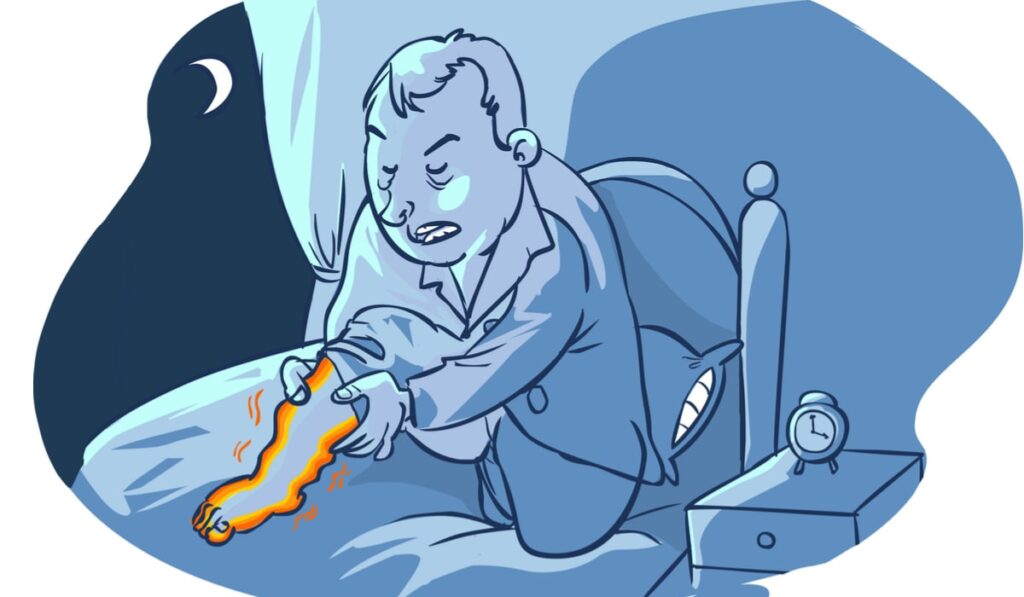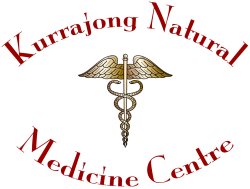Restless Leg Syndrome - A Chinese Medicine Perspective
What is Restless Leg Syndrome (RLS)?
According to the Mayo Clinic [1], Restless legs syndrome (RLS) is a condition that causes an uncontrollable urge to move the legs, usually because of an uncomfortable sensation. It typically happens in the evening or nighttime hours when sitting or lying down. Moving eases the unpleasant feeling temporarily.
Restless legs syndrome, also known as Willis-Ekbom disease, can begin at any age but generally worsens with age. It can disrupt sleep, which in turn interferes with daily activities.
The chief symptom is an urge to move the legs. Common accompanying characteristics of RLS include [1]:
- Sensations that begin after rest. The sensation typically begins after lying down or sitting for an extended time.
- Relief with movement. The sensation of RLS lessens with movement, such as stretching, jiggling the legs, pacing or walking.
- Worsening of symptoms in the evening. Symptoms occur mainly at night.
- Nighttime leg twitching. RLS may be associated with another, more common condition called periodic limb movement of sleep, which causes legs to twitch and kick, possibly throughout the night, while you sleep.

Typically symptoms of RLS are describe as abnormal, unpleasant sensations in their legs or feet. They usually happen on both sides of the body, but infrequently affect the arms.
The sensations, which generally occur within the limb rather than on the skin, are described as:
- Crawling
- Creeping
- Pulling
- Throbbing
- Aching
- Itching
- Electric
Sometimes the sensations are difficult to explain. People with RLS usually don’t describe the condition as a muscle cramp or numbness. They do, however, consistently describe the desire to move their legs.
It’s common for symptoms to fluctuate in frequency and severity. Sometimes, symptoms disappear for periods of time, then return.
How Does Traditional Chinese Medicine (TCM) view Restless Leg Syndrome
According to Traditional Chinese Medicine (TCM) principles, RLS is closely related to organ energy imbalances, especially in the liver, heart, and kidneys. Treatment principles including balancing yin and yang and promoting qi and xue (blood) circulation, nourishing the spleen, dredging the Sanjiao channel, and regulating the du and ren channels.
Research has show acupuncture to be effective in treating restless leg syndrome [2,3,4]. Traditional acupuncture theory proposes the cause of RLS to be a deficiency of Yin and Xue (blood energy), which is responsible for body and brain relaxation. Particularly, the lack of liver Xue and Yin, which controls activity of legs at night, is the main cause of RLS [2,4].
At Kurrajong Natural Medicine Centre our highly qualified and experienced team of practitioners are happy to develop a personalised treatment programme with you. Simply call (02)4573 0784
What You Can Do To Help Yourself
While self-help measures may not cure restless leg syndrome (RLS) completely, they can help manage the symptoms and improve your quality of life. Here are some self-help strategies that may be beneficial:
Establish a regular sleep routine: Maintain a consistent sleep schedule by going to bed and waking up at the same time every day. Sufficient sleep can help alleviate RLS symptoms.
Regular exercise: Engage in moderate exercise regularly, such as walking, swimming, or cycling. Exercise can help reduce symptoms and promote better sleep. However, avoid intense workouts close to bedtime.
Warm baths or massages: Taking a warm bath before bedtime or receiving a massage can relax your muscles and alleviate RLS discomfort.
Apply heat or cold packs: Experiment with hot or cold packs on your legs to find out which provides relief for you. Apply them to the affected areas for temporary relief from symptoms.
Avoid triggers: Identify and avoid substances or activities that worsen your symptoms. Common triggers include caffeine, alcohol, nicotine, and certain medications. Consult your healthcare provider for a comprehensive list of potential triggers.
Practice relaxation techniques: Techniques like deep breathing, progressive muscle relaxation, and yoga can help reduce stress levels and promote relaxation, potentially improving RLS symptoms.
Maintain a healthy lifestyle: Follow a balanced diet, stay hydrated, and manage stress effectively. These lifestyle factors can contribute to overall well-being and potentially minimize RLS symptoms.
Leg stretches and movements: Regularly perform gentle leg stretches, ankle rolls, and other leg movements to improve circulation and reduce discomfort. Avoid sitting or standing for prolonged periods.
Use distractions: Engage in activities that divert your attention from RLS sensations, such as reading, watching TV, or listening to music. Keeping your mind occupied can help reduce symptom awareness.
Improve sleep environment: Ensure your sleep environment is conducive to restful sleep. Create a comfortable, cool, and dark space with minimal distractions to promote better sleep quality.
References
- Mayo Clinic. Restless Leg Syndrome. URL: https://www.mayoclinic.org/diseases-conditions/restless-legs-syndrome/symptoms-causes/syc-20377168 – Last visited: 7th Aug. 2021
- Raissi, G. R., Forogh, B., Ahadi, T., Ghahramanpoori, S., Ghaboussi, P., & Sajadi, S. (2017). Evaluation of Acupuncture in the Treatment of Restless Legs Syndrome: A Randomized Controlled Trial. Journal of acupuncture and meridian studies, 10(5), 346–350. https://doi.org/10.1016/j.jams.2017.08.004
- Bega, D., & Malkani, R. (2016). Alternative treatment of restless legs syndrome: an overview of the evidence for mind-body interventions, lifestyle interventions, and neutraceuticals. Sleep medicine, 17, 99–105. https://doi.org/10.1016/j.sleep.2015.09.009
- Pan, W., Wang, M., Li, M., Wang, Q., Kwak, S., Jiang, W., & Yamamoto, Y. (2015). Actigraph evaluation of acupuncture for treating restless legs syndrome. Evidence-based complementary and alternative medicine : eCAM, 2015, 343201. https://doi.org/10.1155/2015/343201
Disclaimer
Disclaimer information for users of the Kurrajong Natural Medicine Centre, Namaste Yoga Kurrajong and The Herbal Health Coach website.
Page last updated: 26th June 2023
Information provided for education and research information only
The information on this website is presented by Kurrajong Natural Medicine Centre for the purpose of disseminating health information free of charge for the benefit of the public.
While Kurrajong Natural Medicine Centre has exercised due care in ensuring the accuracy of the material contained on this website, the information on the site is made available on the basis that Kurrajong Natural Medicine Centre is not providing professional advice on a particular matter.
This website is not a substitute for independent professional advice. Nothing contained in this site is intended to be used as medical advice and it is not intended to be used to diagnose, treat, cure or prevent any disease, nor should it be used for therapeutic purposes or as a substitute for your own health professional’s advice.
Kurrajong Natural Medicine Centre does not accept any liability for any injury, loss or damage incurred by use of or reliance on the information provided on this website.
Quality of information
Kurrajong Natural Medicine Centre makes every effort to ensure the quality of the information available on this website and updates the information regularly. Before relying on the information on this site, however, users should carefully evaluate its accuracy, currency, completeness and relevance for their purposes, and should obtain any appropriate professional advice relevant to their particular circumstances. Kurrajong Natural Medicine Centre cannot guarantee and assumes no legal liability or responsibility for the accuracy, currency, completeness or interpretation of the information.
The material may include the views or recommendations of third parties and does not necessarily reflect the views of Kurrajong Natural Medicine Centre or indicate a commitment to a particular course of action.
Links to other websites
This website contains links to other websites which are external to Kurrajong Natural Medicine Centre. Kurrajong Natural Medicine Centre takes reasonable care in selecting linking websites but Kurrajong Natural Medicine Centre accepts no responsibility for material contained in a website that is linked to this site. It is the responsibility of the user to make their own decisions about the accuracy, currency, reliability and correctness of information contained in linked external websites.
Links to external websites are provided for the user’s convenience and do not constitute an endorsement or a recommendation of any third party products or services offered by virtue of any information, material or content linked from or to this site. Users of links provided by this site are responsible for being aware of which organisation is hosting the site they visit.
Views or recommendations provided in linked sites may include the views or recommendations of third parties and do not necessarily reflect those of Kurrajong Natural Medicine Centre or indicate a commitment to a particular course of action. .
Disclaimer
Disclaimer information for users of the Kurrajong Natural Medicine Centre, Namaste Yoga Kurrajong and The Herbal Health Coach website.
Page last updated: 26th June 2023
Information provided for education and research information only
The information on this website is presented by Kurrajong Natural Medicine Centre for the purpose of disseminating health information free of charge for the benefit of the public.
While Kurrajong Natural Medicine Centre has exercised due care in ensuring the accuracy of the material contained on this website, the information on the site is made available on the basis that Kurrajong Natural Medicine Centre is not providing professional advice on a particular matter.
This website is not a substitute for independent professional advice. Nothing contained in this site is intended to be used as medical advice and it is not intended to be used to diagnose, treat, cure or prevent any disease, nor should it be used for therapeutic purposes or as a substitute for your own health professional’s advice.
Kurrajong Natural Medicine Centre does not accept any liability for any injury, loss or damage incurred by use of or reliance on the information provided on this website.
Quality of information
Kurrajong Natural Medicine Centre makes every effort to ensure the quality of the information available on this website and updates the information regularly. Before relying on the information on this site, however, users should carefully evaluate its accuracy, currency, completeness and relevance for their purposes, and should obtain any appropriate professional advice relevant to their particular circumstances. Kurrajong Natural Medicine Centre cannot guarantee and assumes no legal liability or responsibility for the accuracy, currency, completeness or interpretation of the information.
The material may include the views or recommendations of third parties and does not necessarily reflect the views of Kurrajong Natural Medicine Centre or indicate a commitment to a particular course of action.
Links to other websites
This website contains links to other websites which are external to Kurrajong Natural Medicine Centre. Kurrajong Natural Medicine Centre takes reasonable care in selecting linking websites but Kurrajong Natural Medicine Centre accepts no responsibility for material contained in a website that is linked to this site. It is the responsibility of the user to make their own decisions about the accuracy, currency, reliability and correctness of information contained in linked external websites.
Links to external websites are provided for the user’s convenience and do not constitute an endorsement or a recommendation of any third party products or services offered by virtue of any information, material or content linked from or to this site. Users of links provided by this site are responsible for being aware of which organisation is hosting the site they visit.
Views or recommendations provided in linked sites may include the views or recommendations of third parties and do not necessarily reflect those of Kurrajong Natural Medicine Centre or indicate a commitment to a particular course of action. .



